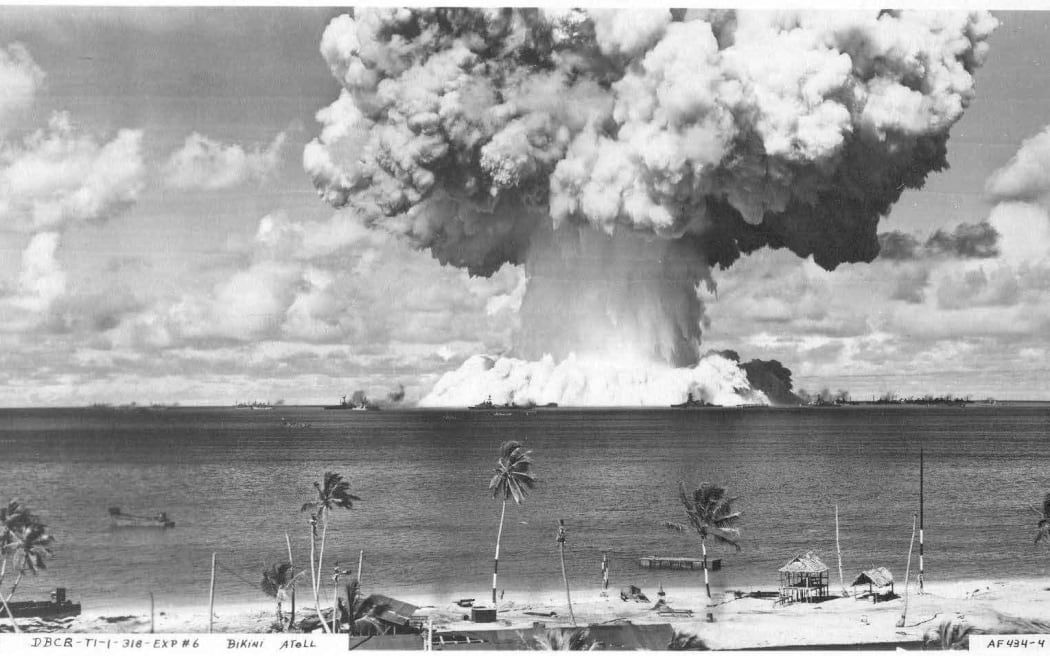By Giff Johnson, Editor, Marshall Islands Journal and RNZ Pacific correspondent
Following widespread media coverage of the collapse of what was a more than US$70 million trust fund for Bikini islanders displaced by American nuclear weapons testing, the United States Congress has demanded answers from the Interior Department about the status of the trust fund.
Four leading members of the US Congress put the Interior Department on notice last Friday that Congress is focused on accountability of Interior’s decision to discontinue oversight of the Bikini Resettlement Trust Fund.
In their three-page letter, the chairmen and the ranking members of the Senate Committee on Energy and Natural Resources and the House Committee on Natural Resources — which both have oversight on US funding to the Marshall Islands — wrote to Interior Secretary Deb Haaland with questions about what has happened to the Bikinians’ trust fund.
It was initially capitalised by the US Congress in 1982 and again in 1988 for a total investment of just under US$110m.
Protests in Majuro
The Congressional letter is the first official US action on the Bikini Resettlement Trust Fund and follows several demonstrations in Majuro over the past six weeks by members of the Bikini community angered by the current lack of money to support their community.
The letter notes that on November 16, 2017, Interior accepted Kili/Bikini/Ejit Mayor Anderson Jibas and the local council’s request for a “rescript” or change in the system of oversight of the Resettlement Trust Fund.
As of September 30, 2016, the fund had $71 million in it, the last audit available of the fund.
“Since then (2017), local officials have purportedly depleted the fund,” the four Senate and House leaders wrote to Haaland.
“Indeed, media reports suggest that the fund may have been squandered in ways that not only lack transparency and accountability, but also lack fidelity to the fund’s original intent.
“If true, that is a major breach of public trust not only for the people of Bikini Atoll, for whom the fund was established, but also for the American taxpayers whose dollars established and endowed the fund.”
They refer to multiple media reports about the demise of the Resettlement Trust Fund, including in the Marshall Islands Journal, The New York Times, Marianas Variety and Honolulu Civil Beat.
No audits since 2016
The Resettlement Trust Fund was audited annually since inception in the 1980s. But there have been no audits released since 2016 during the tenure of current Mayor Jibas.
The lack of funds in the Resettlement Trust Fund only became evident in January when the local government was unable to pay workers and provide other benefits routinely provided for the displaced islanders.
Since January, no salaries or quarterly nuclear compensation payments have been made, leaving Bikinians largely destitute and now facing dozens of collection lawsuits from local banks due to delinquent loan payments.

‘Fund is in jeopardy’
The letter from Energy Chairman Senator Joe Manchin and ranking member Senator John Barrasso, and Natural Resources Chair Bruce Westerman and ranking member Raul Grijalva says American lawmakers “have a duty to oversee the management of taxpayer dollars appropriated for the resettlement and rehabilitation of Bikini Atoll”.
The letter also repeatedly makes the point that the money in the trust fund was only to rehabilitate and resettle Bikini Atoll, with projects on Kili or Ejit islands limited to only $2 million per year, subject to the Interior Secretary’s prior approval.
“Regrettably, the continued viability of the fund to serve its express purpose now appears to be in jeopardy,” the US elected leaders said.
The US leaders are demanding that Haaland explain why the Interior Department walked away from its long-standing oversight role with the trust fund in late 2017.
Specifically they want to know if the Office of the Solicitor approved the decision by then-Assistant Secretary Doug Domenech to accept the KBE Local Government’s rescript “as a valid amendment to the 1988 amended resettlement trust fund agreement.’
They also suggest Interior’s 2017 decision has ramifications for US legal liability.
Key questions
“Does the department believe that the 2017 rescript supersedes the 1988 amended resettlement trust fund agreement in its entirety?” they ask.
“If so, does the department disclaim that Congress’s 1988 appropriation to the fund fully satisfied the obligation of the United States to provide funds to assist in the resettlement and rehabilitation of Bikini Atoll by the people of Bikini Atoll?
“And does that waive any rights or reopen any potential legal liabilities for nuclear claims that were previously settled?”
They also want to know if KBE Local Government provided a copy of its annual budget, as promised, since 2017.
The letter winds up wanting to know what Interior is “doing to ensure that trust funds related to the Marshall Islands are managed transparently and accountably moving forward?”
This article is republished under a community partnership agreement with RNZ.
